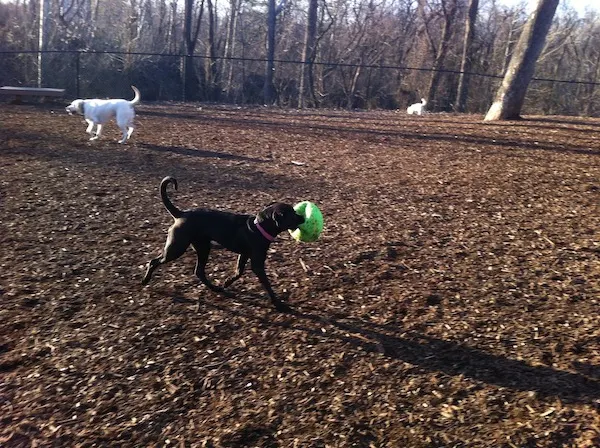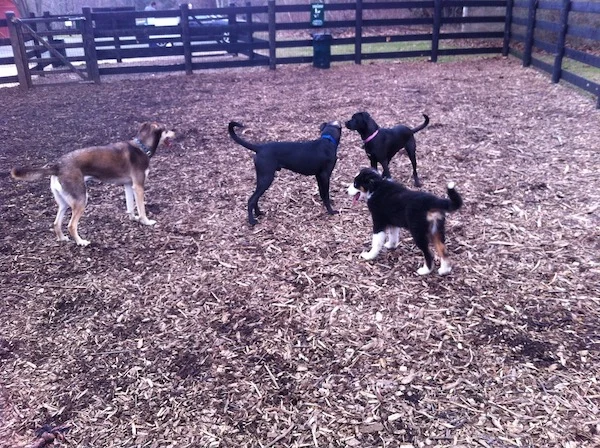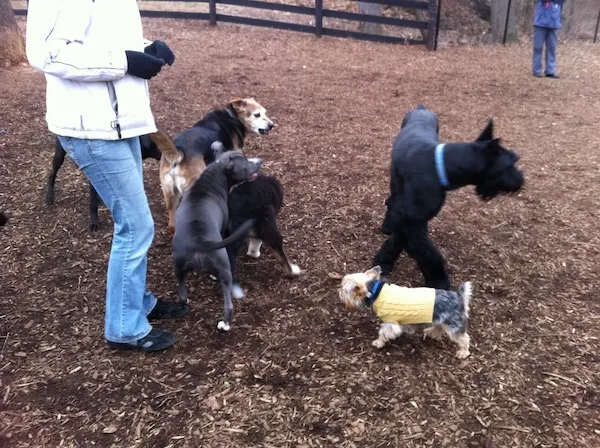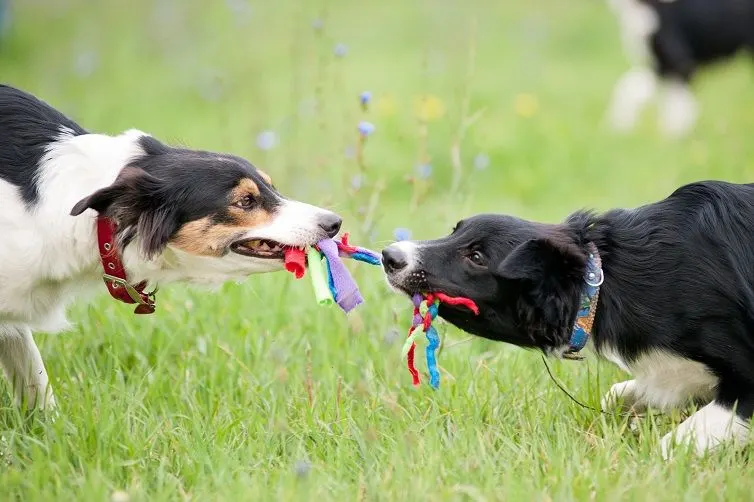Dog parks are off-leash areas that let dogs interact with each other and stretch their legs mostly free of charge, although there are also a few members-only dog parks. Most feature water stations, poop bags, and are at least partially fenced-in. Sounds pretty good so far, right?
While we can probably all agree that the concept behind dog parks is a clever one, there are also risks to be aware of.
Benefits of dog parks – are dog parks a good idea?
Let’s start with the benefits of dog parks.
Cons of dog parks – are dog parks bad?
Dog parks also have a few downsides, particularly the following:
- Some dog owners pay more attention to their coffees, kids or phones than to what their dogs are doing at the dog park.
- This can easily cause scuffles that have the potential to get out of hand and end in dog fights. For more information, see our section “What to do if there is a fight at the dog park?”
- Dogs can pick up sicknesses like kennel cough (= bordetella) from other sick dogs at the park, even if they’ve been vaccinated. That’s because the bordetella vaccine doesn’t protect against all strains of the disease.
- Too much input for shy dogs. There’s typically a lot of noise at dog parks, and timid dogs can easily be overwhelmed by a pack of confident dogs who roughhouse, bark and race around.
- A dog who’s not under voice control can be a danger to himself if he decides to take off at a partially fenced-in dog park and runs into a busy street.
What types of dogs should go to the dog park?
Keeping the pros and cons of dog parks in mind, there are certain types of dogs who are ideal candidates for dog parks. They’re:
- Socialized dogs who do well around other dogs, people and kids. Although it’s not ideal for people to bring their small kids along to dog parks, many do. If your dog doesn’t appreciate screaming kids, it’s something to keep in mind and look out for when you arrive at the dog park.
- Dogs who enjoy playing with other dogs. It’s unlikely that your dog will be the only pup at a dog park, so he should be the outgoing kind of dog who enjoys being around and engaging with others.
- The ones who are under voice control. This means that they listen to their owner and come back when called or let go of something when told.
When not to bring your dog to a dog park
Everyone who takes their dog to a dog park should be respectful of the other dogs and people present. That means there are times when your dog simply shouldn’t go to a dog park, especially:
- When he’s sick. This should be a no-brainer as public spaces like dog parks are ideal for passing illnesses from one dog to another. A dog who’s sick also does best recovering at home, and may be on restricted activity orders from his vet either way.
- If he generally does poorly around other dogs. Pups who have a tendency of lunging at other dogs and mounting them have no business being at a dog park. They’re the ones whose crazy energy can cause dog fights.
- If he doesn’t like to share toys. It’s almost impossible not to find toys at dog parks, so dogs who guard toys shouldn’t be set up for failure by going to a dog park.
See That Mutt’s article My dog is possessive of toys at the dog park for more information and ideas of how to deal with this behavior.

- If he has a tendency of guarding his human from other dogs. Many dogs who go to dog parks are social butterflies and enjoy getting attention from the different humans at the park. That’s why those who are protective of their owner(s) shouldn’t go there.
- If he’s a male, un-neutered dog or a female dog in heat. Dog parks are busy areas where many different dogs mingle and play together, that’s why dogs who are still able to reproduce shouldn’t be taken there.
See That Mutt’s article How to stop your dog from guarding you at the dog park for solutions.
Different kinds of dog parks
Did you know that dog parks vary largely in size and setup? The concept is the same of course, but there are several different types:
Large & open with trails
Some large dog parks cover several acres and feature a variety of (paved or mulched) trails, benches, drinking water areas, rinse stations, and possibly even a beach, stream or pond for some doggie swimming fun.
They’re usually only partially fenced-in, so dogs who go there should have an excellent recall and not be interested in going on solo adventures outside of the park.

Small fenced-in
The small fenced-in types of dog parks can be found at many apartment complexes. They’re just large enough to safely let dogs stretch their legs and play off leash a bit.

Areas for big and small dogs
Some dog parks have separate areas for big and small dogs. That’s a good solution for people who know that their smaller dogs do better with similar sized dogs. That way, they won’t run the risk of being trampled or jumped on. The same goes for owners of large dogs who know their pups’ rough way of playing doesn’t change with a small dog.
The picture below features big and small dogs in the same area, which isn’t always ideal as we just pointed out. However, some small dogs don’t mind being around and playing with larger dogs, especially if they live with larger pups.

All open
There are even dog parks that aren’t fenced-in at all. Your dog’s recall needs to be exceptionally good for off-leash playtime fun at these parks.
If you’re not sure what to expect from a specific dog park, it’s a good idea to check it out by yourself before taking your dog.

One of the most common misconceptions is that dog parks are good for socialization for all dogs. They ARE good for ongoing socialization of confident dogs who have already been socialized to the world around them.
They’re also good for puppy socialization once they’ve received all of their shots.
However, dog parks aren’t good for socializing shy or aggressive dogs. It’s a lot better to practice in a more controlled and calmer environment like an obedience class with a knowledgeable dog trainer. There are also those dogs who will truly never enjoy being around other dogs, and that’s ok too. It’s up to us to know our dogs and their body language.
See That Mutt’s article Is dog daycare a good idea? for ideas about socializing dogs.

When can my puppy go to the dog park?
Puppies can start going to the dog park once they’ve had all their shots. This is generally when they’re around 16 weeks old (4 months). They shouldn’t go prior to that because their immune system is still fragile.
Keeping in mind that many different dogs visit dog parks, chances are high that a puppy who hasn’t received all of her shots yet can pick up a disease from a sick dog.
Don’t hesitate to ask your vet if your puppy is ready for some dog park playtime if you’re unsure.
Are dog parks stressful for dogs?
Dog parks can be stressful for some dogs, especially for those who aren’t used to being around strange dogs and who are very shy. Dogs who play hard can also easily become overstimulated and stressed out.

That’s why it’s so important to closely monitor your dog at all times and to leave the dog park before things get out of hand. As a general rule of thumb, dog park visits shouldn’t exceed 90-120 minutes.
See That Mutt’s article When to intervene at the dog park for more information on closely monitoring your dog.
What to do if there is a fight at the dog park?
Dog fights can be scary and can easily happen at a dog park, especially with dogs who are overstimulated, protective of toys, food and/or their owners.
The best way to break up a dog fight is to throw water onto the fighting dogs. There are usually water bowls and water pumps/hoses at dog parks, so water should be easy enough to get a hold of.
But even if water is available, it’s a good idea to be prepared and carry something on you that can be used to break up dog fights, such as:

- Throw a filled poop bag at the fighting dogs.
- Throw jackets over the fighting dogs’ heads to cover their eyes and stop the craziness.
- Blow into a loud whistle. Consider carrying one around your neck on a lanyard when you take your dog to the park.
- Use pepper spray or a similar deterrent.
It’s never a good idea to reach for the collars of the fighting dogs, especially if they’re medium to larger dogs. It’s certainly the first impulse (been there, done that), but the chances of getting physically hurt are just too high.
Are dog parks safe from disease?
Unfortunately, one of the downsides of dog parks is that they aren’t safe from disease. On the contrary, they’re actually an easy way for a dog to pick up a disease like bordetalla (= kennel cough) or parasites because so many different dogs go there.
That’s why you should never take your sick dog to a dog park. Likewise, it’s a good idea to literally walk away if you notice a dog coughing or acting sick in any other way.
How dog parks benefit communities
Dog parks are a great way to bring people from different walks of life together who share a common interest – dogs! It also allows dogs to socialize with other dogs. However, see our section Are dog parks good for socialization? for more information about this topic.

Besides the socialization aspect, dog parks give owners and their dogs the opportunity to get outside together in a safe way. Going there can be a safer alternative to exercising a dog in busy cities, and it makes it easier for cities to enforce their leash laws.
Well-exercised dogs are also less likely to exhibit problem behaviors such as excessive barking or destroying a rental space. However, it’s important to understand that playtime at dog parks does not replace structured walks. Most dogs do best with a combination of supervised playtime and leashed walks.
As a little side note, we should keep in mind that it’s the communities who pay for public dog parks and their maintenance. In order to keep it that way, dog park users should all be smart and respect the various rules in order to keep them safe, clean and ultimately free of charge.
Dog park rules
To recap, the following common-sense rules should be observed at any dog park:
- Always pick up after your dog. Most dog parks provide poop bag stations, but it’s a good idea to bring your own along, just in case.
- Take your dog’s leash off before you enter the dog park play area. There’s an immediate imbalance between leashed and off-leash dogs. Well set-up dog parks have a small fenced-in section right before the larger play area where you can safely take your dog’s leash off and also put it back on before leaving.
- Always carry your dog’s leash on you in order to be able to quickly leash him if necessary and leave.
- Make sure your dog wears her collar with ID tags.
- Pay attention to your dog and remove him from the park if he annoys other dogs or displays aggressive behavior.
- Don’t bring sick dogs into the park
- Don’t bring your female dog if she’s in heat (dogs that are not spayed or neutered are often not allowed in dog parks)
- Make sure your puppy has received all vaccinations prior to bringing her to the dog park. That means your puppy should be at least 4 months old before going to the dog park.
- Your dog’s rabies vaccination needs to be current. The same applies to dog licenses if your county requires them.
- Avoid bringing treats or human food to the dog park. This can easily cause resource guarding issues and end up in a dog fight.
- Your dog needs to be under voice control at all times. Always be present to supervise your dog(s). Never leave your dog alone at a dog park.
- If small kids are allowed and you bring them along, you need to monitor them closely.
See That Mutt’s article Should children be allowed in dog parks? for more thoughts on this highly debated topic.

Now we’d like to hear from you!
Now it’s your turn! Do you take your dog to dog parks? Have you had good and/or bad experiences?
Let us know in the comments!
Barbara Rivers writes regularly for That Mutt. She is certified in raw dog food nutrition from Dogs Naturally Magazine and the author of three ebooks about balanced raw dog food. She is a blogger at K9s Over Coffee.
Related posts:

Taylor Hansen
Wednesday 16th of December 2020
I like how you mentioned that dog parks are good for socialization for dogs. My dog has been inside a lot since I'm always working. I want to find a good dog park where she can run and play.
Mary
Friday 14th of August 2020
My dog was properly socialized, but he hated going to dog parks. He never got into fights and he wasn't afraid of other dogs-- he just didn't like the company of other dogs! He much preferred just chilling with people.
Kate R.
Sunday 26th of July 2020
Our dog Alice loves the two dog parks near our house. One is free to the public and sponsored by a church and the other has a monthly fee. Both come with pros and cons and clear rules for participation. I will say the one we pay for is definitely our first choice. It is a fully fenced 16 acre property with a small creek dividing it with a pond for the dogs to swim in. There is tall grass our dog loves hopping through and playing with other dogs. It feels more like a dog friendly nature preserve. She always comes home both mentally and physically tired. It is also nice getting to know other owners, watching her make friends and be able to do some off leash training with distractions. Both require proof of vaccinations but the paid park also only allows membership after a temperament test. For us visits to the dog park are an important part of our routine and I am very thankful they are a resource in my community.
Lindsay Stordahl
Sunday 26th of July 2020
That sounds amazing!
Kathleen Glielmi
Sunday 26th of July 2020
In a world where open land is becoming a thing of the passed and even many houses have postage stamp sized yards, dog parks are a needed. Some cities require current vaccination and rabies and have separate areas for large and small dogs, some even have puppy under x months. As far as a female in heat... I foster for a Rescue and had an intact female as a new foster. I prayed she wouldn't come into season before her spay surgery. I had the dogs outside to potty and play when one of my dogs hooked up with the female foster. On a Sunday morning, on the front lawn, there were these two tied to each other. Another good reason to not allow females in season in a dog park.
Dulcie
Sunday 26th of July 2020
There aren’t any dog parks in Norfolk U.K.......and I don’t actually know of any in the U.K. we tend to hire a dog play field.......for our own dogs for an hour at a cost of £8-£10 per hour and about £3-£5 a half hour. Much less stress!!